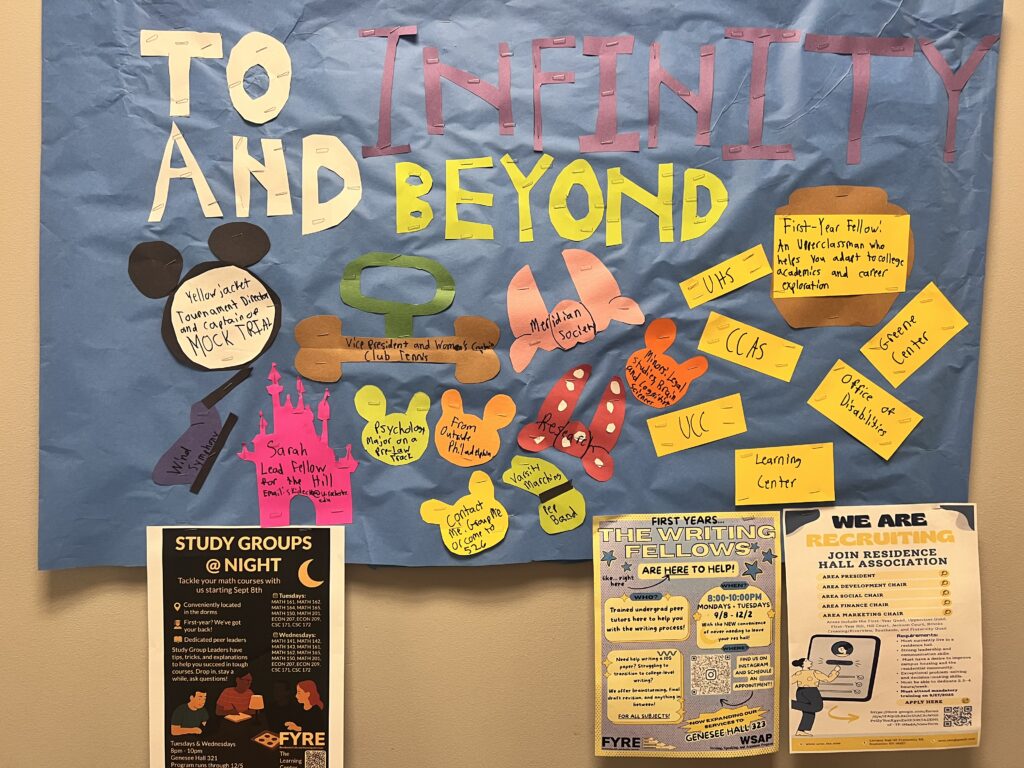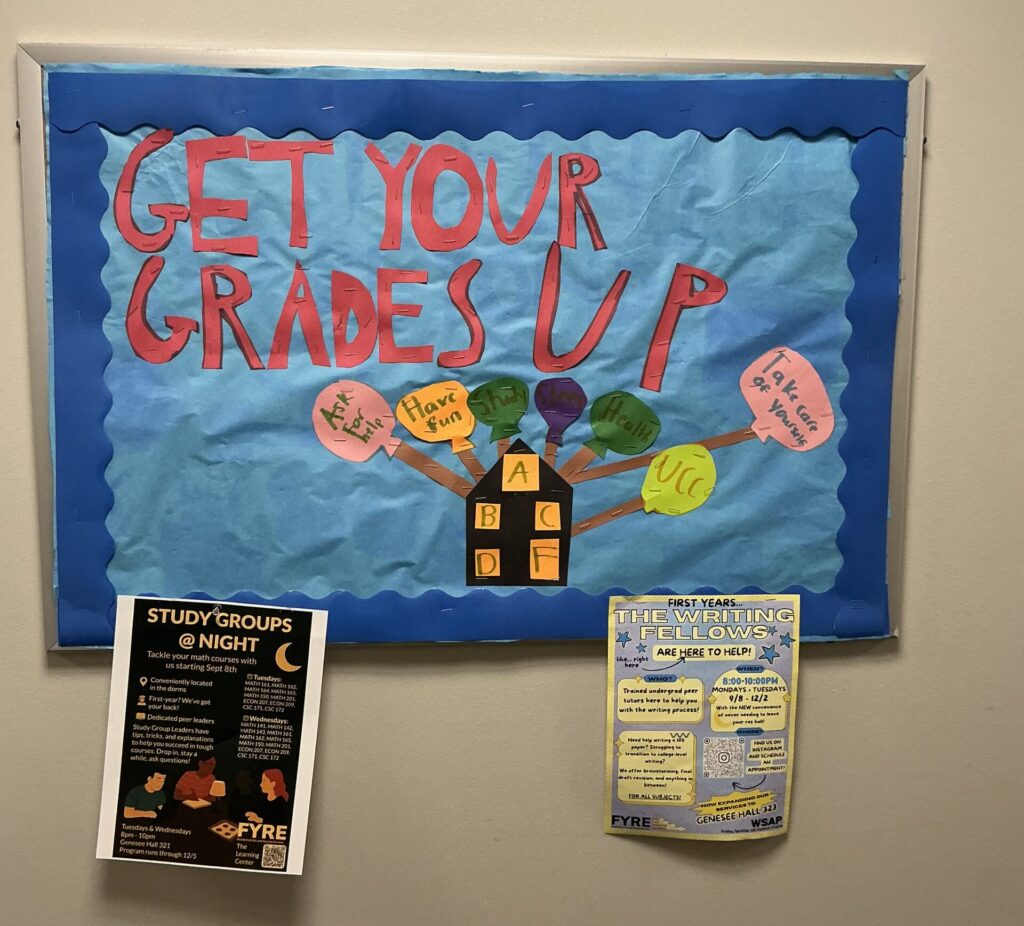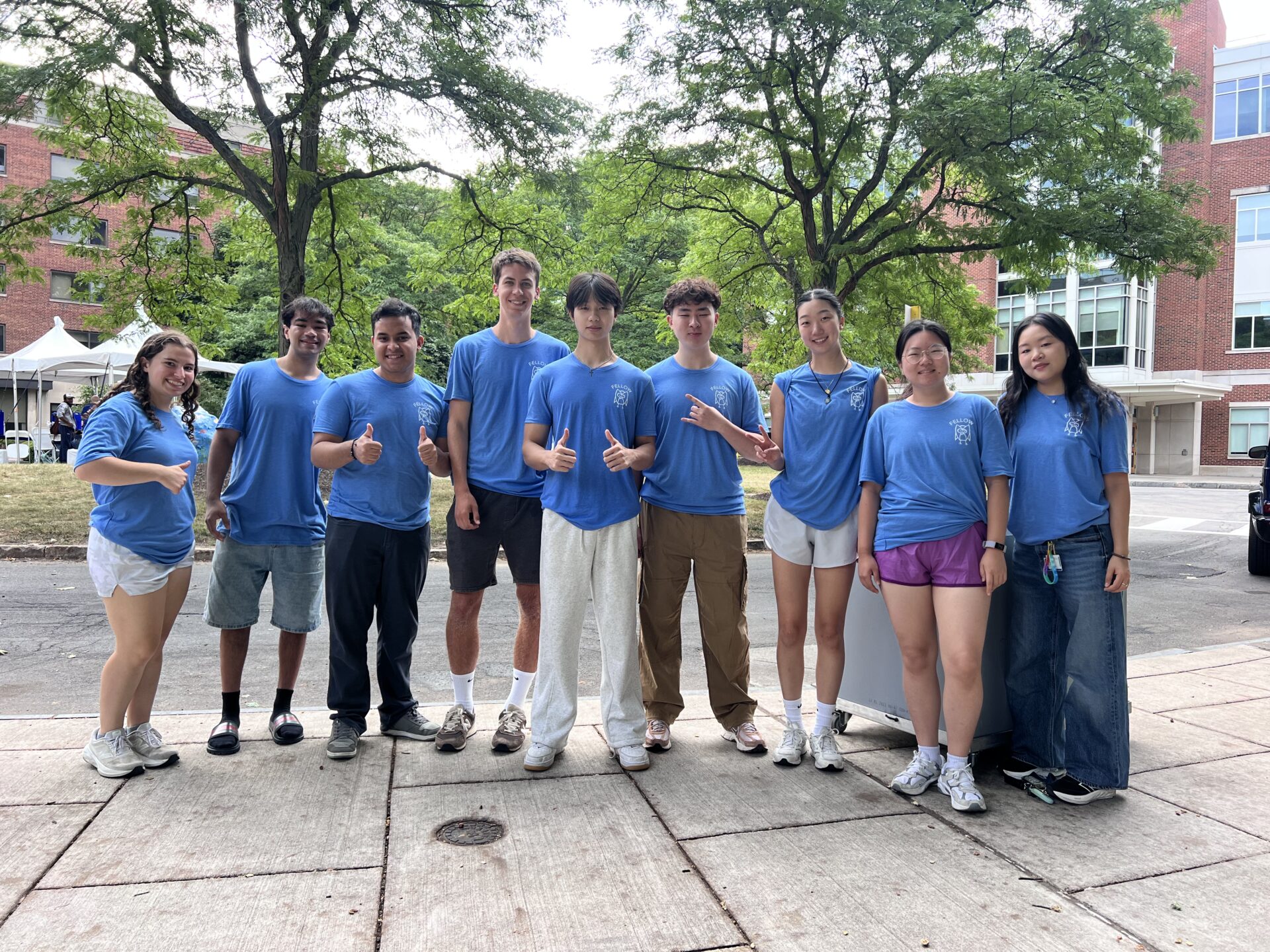A new school. A new city. New people. Everything is new as a first-year, and it can be scary. However, everyone on campus is willing to help you.
So… how do you get the help you need to succeed? You ask! There are so many different resources on campus that can help you at URochester, a few will be highlighted below.
The First-Year Residential Experience (FYRE) is a program implemented to help first-year students acclimate to college life. There is a FYRE team in each hall. The team consists of:
- A Residential Advisor (RA). The RA’s job is to build community in the hall and to make sure everyone is safe in the hall.
- A D’Lion. The D’Lion’s job is to help residents fit in socially, making sure they join clubs, deal with homesickness, and make friends. They also provide community service opportunities to their residents.
- One of their big roles is making sure their residents are active on campus. There are over 250 clubs ranging from professional, club sports, affinity, religious, musical, and academic clubs. If we don’t have a club, you can create your own!
- They promote the Medallion Program, which is a group dedicated to helping students develop their leadership skills.
- Celina Mao, a D’Lion says “Having never lived apart from their family, freshmen often find the transition to college incredibly difficult. As a D’Lion, I help my residents make connections, find activities they enjoy, and direct them to clubs. I want to help them grow a community and make their college experience unique and perfect for them. By hosting monthly events, I help them bond with their fellow residents through chatting and snacks. I hope to create a welcoming and inviting environment for them. I’m also always available to quickly chat with my residents to answer various questions and direct them to helpful resources.”

- A First-Year Fellow. A First-Year Fellow is an upperclassman student who helps first-year students transition to college academics and explore possible careers. They collaborate with a variety of offices on campus. Below are just some of the offices they have interacted with over the past two years.
- Center for College Advising Services: They help students pick out classes and advise them to be on track for graduation. Every student is assigned a general advisor, typically in this office. As students declare their majors and minors, they get specific advisors in the department(s).
- Greene Center (career center): They help students connect with alumni providing networking opportunities, write their cover letters, write their resumes, provide professional clothing, and advise students.
- Writing, Argument, and Speaking Program: Through peer and professor help, students can receive individual tutoring sessions to improve their essays or presentations. They have programs in the residential buildings.
- Office of Undergraduate Research: Since many students are interested in participating in research, they have specifically talked to first-year students about how to get involved with research opportunities. With over 40 research ambassadors, students can connect with ambassadors with a similar background to allow students how receive research opportunities.
- Learning Center: They provide a variety of resources to help students do well. They have programs in the residential buildings. These resources include:
- Tutoring, a student receives individualized help from a student who has already taken the class and has done well.
- Academic coaching, where students can receive help individually on how to do better, including dealing with anxiety, time management skills, or study tips.
- Peer-Led Team Learning (PLTL) Workshops, where a small group of students works on a set of problems together.
- Study zones, where students can study a variety of topics.
- Study groups, where groups of students study based on the same course to hold themselves accountable for studying.
- Personally, being the lead first-year fellow for the hill it has enabled me to mentor first-year students on how to do well academically. Whether that is meeting with individual residents and telling them about my experiences or helping them choose classes, I make sure that all of my residents are doing well and reach out to them to see if they need or want any help. Academics are an important part of college, which can be stressful, so hearing how upperclassmen manage their time, study tips, registration tips, how to satisfy the open curriculum, and overall how to do well in classes, or receive internship opportunities, is very helpful to my residents.

Besides these resources, there are many other resources that can help first-year students.
- Kearns Center: They support students in achieving their academic goals, with a focus on supporting first-generation students.
- Office of Mentoring and Student Advocacy: They help students from a variety of backgrounds by providing them guidance, resources, and networking opportunities.
- Language Center: They host weekly conversation hours in a variety of languages and also offer tutoring sessions for students taking language classes who may need additional help.
- Paul J. Burgett Intercultural Center (BIC): They allow students to feel welcomed and included, whatever their background.
- Office Hours: Your professors are here to help you and want you to succeed. Office hours are really helpful to know what is expected of you in a class. In addition, it can also help you get to know your professor. All of the professors have interesting backgrounds and can help you connect with people who are already in the field you are pursuing.
College is a time for growth, exploration, and asking questions. Don’t be afraid to reach out, get involved, and take advantage of the support around you. The resources and people on campus are here to guide you every step of the way. All you have to do is take the first step and ask. You will be surprised how many people are eager to help you succeed.

